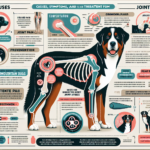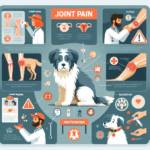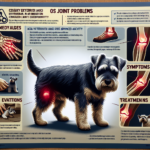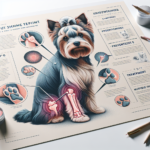Entlebucher Mountain Dog Joint Pain: Causes, Symptoms, Prevention, and Treatment

Introduction
The Entlebucher Mountain Dog, also known as the Entlebucher Sennenhund, is the smallest of the four Swiss Mountain Dog breeds. Originating from the Entlebuch region in Switzerland, this breed was traditionally used for herding and guarding livestock. Known for their agility, intelligence, and loyalty, Entlebuchers are medium-sized dogs with a sturdy build, typically weighing between 45 to 65 pounds. They have a distinctive tricolor coat and a keen, alert expression.
While Entlebuchers are generally healthy dogs, they are not immune to certain health issues. Common concerns include eye problems, urinary issues, and joint-related conditions. Joint pain, in particular, is a significant concern for this breed due to their active lifestyle and genetic predispositions.
Maintaining joint health is crucial for Entlebucher Mountain Dogs to ensure they lead a comfortable and active life. Joint issues can severely impact their mobility and overall quality of life, making it essential for owners to be aware of the causes, symptoms, preventive measures, and treatment options for joint pain in this breed.
Breed-Specific Joint Pain Risks
Genetic Predisposition
Entlebucher Mountain Dogs are genetically predisposed to several joint-related issues, including hip dysplasia, elbow dysplasia, and arthritis. Hip dysplasia is a condition where the hip joint does not fit into the hip socket properly, leading to pain and mobility issues. Elbow dysplasia involves abnormal development of the elbow joint, causing lameness and discomfort. Arthritis, a degenerative joint disease, can also affect Entlebuchers, leading to chronic pain and stiffness.
Age-Related Risks
As Entlebuchers age, the risk of developing joint pain increases. While young dogs may show early signs of joint issues, these problems often become more pronounced as they reach middle age and beyond. Owners should be particularly vigilant once their dog reaches the age of 5 to 7 years, as this is when age-related joint degeneration typically begins to manifest.
Activity Level and Joint Stress
Entlebucher Mountain Dogs are known for their high energy levels and love for physical activities such as running, hiking, and herding. While regular exercise is essential for their overall health, excessive or high-impact activities can put additional stress on their joints. Owners should balance their dog’s activity levels to prevent overexertion and minimize the risk of joint injuries.
Common Symptoms of Joint Pain in Entlebucher Mountain Dogs
General Symptoms
- Limping: One of the most noticeable signs of joint pain is limping or favoring one leg over the other.
- Stiffness: Dogs with joint pain may exhibit stiffness, especially after resting or sleeping.
- Reluctance to Move: A dog experiencing joint pain may be hesitant to engage in physical activities they once enjoyed.
- Difficulty Rising: Struggling to get up from a lying or sitting position can indicate joint discomfort.
- Swelling: Inflammation around the affected joint may be visible.
- Behavioral Changes: Irritability, lethargy, or changes in appetite can also be signs of joint pain.
Breed-Specific Symptoms
In Entlebucher Mountain Dogs, joint pain may manifest in specific ways due to their unique build and activity levels. Owners may notice a decrease in their dog’s enthusiasm for herding or agility activities. Additionally, Entlebuchers may show signs of discomfort when climbing stairs or jumping into vehicles, activities that typically involve significant joint movement.
When to Consult a Vet
If an Entlebucher Mountain Dog exhibits any of the above symptoms for more than a few days, it is crucial to consult a veterinarian. Early diagnosis and intervention can significantly improve the dog’s quality of life and prevent further joint damage. Regular veterinary check-ups are also essential for monitoring joint health and catching any issues early.
Preventive Measures for Joint Health
Exercise Recommendations
Regular, moderate exercise is vital for maintaining joint health in Entlebucher Mountain Dogs. Activities such as walking, swimming, and controlled play can help keep their joints flexible and muscles strong without causing excessive stress. Owners should avoid high-impact activities like jumping or running on hard surfaces, which can exacerbate joint issues.
Dietary Suggestions
A balanced diet rich in essential nutrients can support joint health in Entlebuchers. Foods containing glucosamine, chondroitin, and omega-3 fatty acids are particularly beneficial for joint maintenance. These nutrients can be found in high-quality commercial dog foods or added as supplements. Consulting a veterinarian for dietary recommendations tailored to the dog’s specific needs is always a good idea.
Weight Management
Maintaining a healthy weight is crucial for reducing joint stress in Entlebucher Mountain Dogs. Excess weight can put additional pressure on the joints, exacerbating pain and discomfort. Owners should monitor their dog’s weight and adjust their diet and exercise routine as needed to keep them within a healthy weight range.
Early Screening and Monitoring
Regular veterinary check-ups and early screening for joint issues can help catch problems before they become severe. For Entlebuchers, specific screening tests such as hip and elbow evaluations can be beneficial. Early detection allows for timely intervention and management, improving the dog’s long-term joint health.
Treatment Options for Joint Pain
Non-Surgical Treatments
Several non-surgical treatment options can help manage joint pain in Entlebucher Mountain Dogs:
- Medications: Anti-inflammatory drugs and pain relievers can help reduce pain and inflammation.
- Physical Therapy: Therapeutic exercises and massages can improve joint flexibility and muscle strength.
- Lifestyle Adjustments: Modifying the dog’s activity levels and providing a comfortable living environment can alleviate joint stress.
Surgical Options
In severe cases of joint pain, surgical intervention may be necessary. Common surgical options for Entlebuchers include:
- Hip Replacement: Replacing the damaged hip joint with an artificial one can significantly improve mobility and reduce pain.
- Arthroscopy: A minimally invasive procedure to remove damaged tissue or repair joint structures.
- Joint Fusion: Fusing the bones in a joint to eliminate pain caused by movement.
Consulting with a veterinary orthopedic specialist can help determine the most appropriate surgical option for the dog’s specific condition.
Alternative Therapies
Alternative treatments can also be beneficial for managing joint pain in Entlebucher Mountain Dogs:
- Acupuncture: This traditional Chinese medicine technique can help reduce pain and inflammation.
- Hydrotherapy: Water-based exercises can improve joint mobility and muscle strength without putting stress on the joints.
- Massage Therapy: Regular massages can help alleviate muscle tension and improve circulation around the joints.
Lifestyle and Management Tips
Daily Care Routine
A consistent daily care routine can help manage and alleviate joint pain in Entlebucher Mountain Dogs:
- Morning: Gentle stretching exercises and a short walk to loosen up stiff joints.
- Midday: Controlled playtime or swimming to maintain joint flexibility and muscle strength.
- Evening: A balanced meal with joint-supporting supplements and a relaxing massage to ease any discomfort.
Modifying the Home Environment
Making the home environment more comfortable for a dog suffering from joint pain can significantly improve their quality of life:
- Ramps: Installing ramps can help the dog navigate stairs or get into vehicles without putting stress on their joints.
- Orthopedic Beds: Providing a supportive bed can help reduce pressure on the joints during rest.
- Non-Slip Flooring: Ensuring the floors are non-slip can prevent falls and reduce joint strain.
Long-Term Management
Long-term management strategies are essential for keeping an Entlebucher Mountain Dog active and happy despite joint pain:
- Regular Vet Check-Ups: Routine veterinary visits to monitor joint health and adjust treatment plans as needed.
- Consistent Exercise: Maintaining a regular, low-impact exercise routine to keep joints flexible and muscles strong.
- Balanced Diet: Providing a diet rich in joint-supporting nutrients to promote overall joint health.
FAQs About Entlebucher Mountain Dogs and Joint Pain
What are the early signs of joint pain in Entlebucher Mountain Dogs?
Early signs of joint pain include limping, stiffness, reluctance to move, and difficulty rising from a lying or sitting position. Behavioral changes such as irritability or lethargy may also indicate joint discomfort.
How can I prevent joint pain in my Entlebucher Mountain Dog?
Preventive measures include regular, moderate exercise, a balanced diet rich in joint-supporting nutrients, maintaining a healthy weight, and regular veterinary check-ups for early screening and monitoring.
Are there specific exercises that are beneficial for Entlebucher Mountain Dogs with joint pain?
Yes, low-impact exercises such as walking, swimming, and controlled play are beneficial for maintaining joint health without causing excessive stress. Avoid high-impact activities like jumping or running on hard surfaces.
What dietary supplements can help support joint health in Entlebucher Mountain Dogs?
Supplements containing glucosamine, chondroitin, and omega-3 fatty acids can support joint health. Consult a veterinarian for specific recommendations tailored to your dog’s needs.
When should I consider surgical options for my dog’s joint pain?
Surgical options should be considered if non-surgical treatments are ineffective and the dog’s quality of life is significantly impacted by joint pain. Consult a veterinary orthopedic specialist to determine the most appropriate surgical intervention.
Conclusion
Joint pain is a significant concern for Entlebucher Mountain Dogs, given their genetic predispositions and active lifestyle. Understanding the causes, symptoms, preventive measures, and treatment options is crucial for maintaining their joint health and overall well-being. By taking proactive steps such as regular exercise, a balanced diet, weight management, and early screening, owners can help their Entlebuchers lead a comfortable and active life. Regular veterinary consultations are essential for monitoring joint health and addressing any issues promptly. With proper care and management, Entlebucher Mountain Dogs can continue to enjoy their energetic and loyal nature without being hindered by joint pain.




